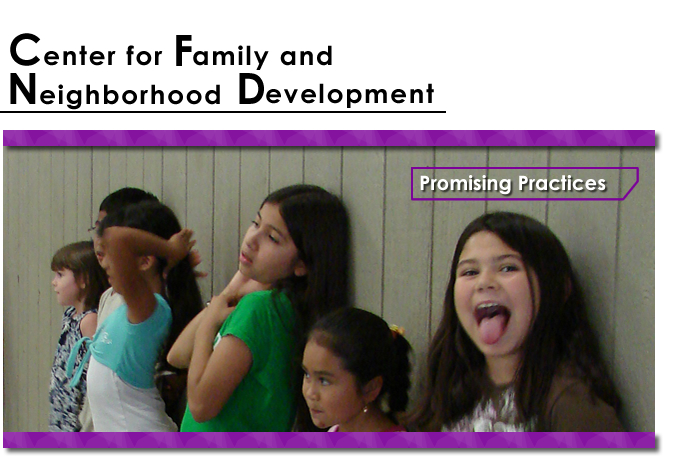Positive Youth Development Promising Practices |
| 01. |
Involvement of Family and Other Caring Adults reinforces communication on teen issues and show support for what youth are learning. Programs that incorporate family and caring adult involvement can develop positive relationships. Itís important to take family schedules into account when planning programs. |
| 02. |
Housing in a Safe Environment will prove to have effective programs and strategies. Safe spaces provide youth a comfortable environment allowing them to participate more candidly. |
| 03. |
Using Strengths and Assests of the youth based off an assessment empowers youth. Program development should be focused on the youth’s strengths. |
| 04. |
Highly Committed, Trained, and Inspired Staff leads to successful quality programs. Staff should be highly qualified in training and experience to lead students. They should be committed to positive youth development and be inspired to enable youth to make positive decisions. |
| 05. |
Developing Sustainable Programs including all Aspects of a Young Personís Life-Home, School, and Community strengthens new skills and knowledge in different environments. Programs should include policies that have long term support and follow-up. |
| 06. |
Positive Developmental Goal Setting yields results. Programs need clear goals and expectations and defined outcomes. |
| 07. |
Youth Engaging in Decision Making and Problem Solving
enables them to draw their own meaning from different experiences. Increase opportunities for new responsibilities and add time for reflection to express what they have learned to themselves and others. |
| 08. |
Service Learning promotes positive values, helps reduce risk behaviors, improves critical thinking and problem solving, and increases job preparedness, good citizenship, and empathy for others. Youth develop a sense of mattering by contributing to their community |
| 09. |
Treating Youth as Resources allows them to feel needed. |
| 10. |
Diverse and Quality Experiences
offered in programs builds a sense of achievement. |
All of these best practices should incorporate an assessment of the youth’s needs, existing services, and cultural relevance.
* Sources: ACT for Youth Upstate Center of Excellence Best Practices for Youth Development Programs April 2003; Michigan State University Extension Youth Development Area of Expertise Best Practices and Their Impacts in Out-Of-School Time: Research Findings and Implications for Youth Development Programs; When School Is Out Where Need Meets Opportunity: Youth Development Programs for Early Teens; The National Governors Association Center for Best Practices (2000) |

